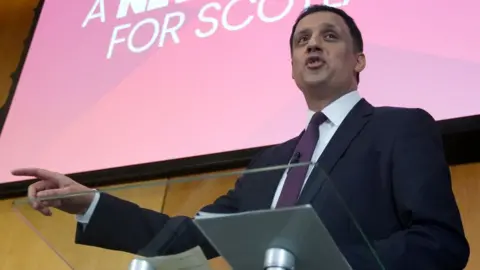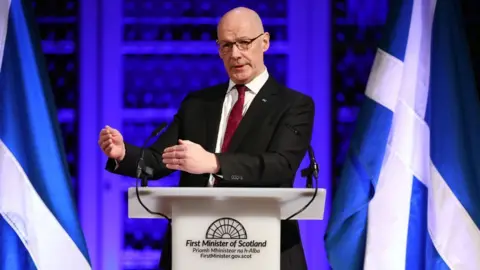Sarwar hopes to pull rug from SNP with Budget call
 PA Media
PA MediaLabour has - more or less - ended fears that the Scottish Budget could fall.
Its decision to abstain in the parliamentary votes ensures the Scottish government has enough political clout to get its tax and spending plans through.
Unless Labour has a sudden change of heart before the final vote at the end of February, this debate is over.
The first minister's dire warnings of damaging financial and political consequences of a failure to get a budget through no longer require serious concern.
The NHS is not going to be starved of additional investment and public sector pay rises should happen as promised.
To be fair, John Swinney himself said he was confident of securing a deal. The expectation was that it would be with at least one of the smaller parties, the Greens or the Liberal Democrats.
That may still happen.
Political pressure
In announcing his position, the Scottish Labour leader Anas Sarwar claimed that deal was already in the bag.
But ensuring Labour MSPs do not vote against the Budget turns the support of others into an insurance policy for the Scottish government.
Ministers need some help from political rivals because they do not command a majority of the votes in parliament.
Labour's move also makes me wonder whether it is worth Swinney proceeding with a series of planned events to hammer home the case for his budget being backed.
Labour seems to have pulled the rug from under that plan and turned some political pressure back on the SNP.
Sarwar has actually offered to vote for the Budget (whatever he perceives as its deficiencies) if the Scottish government speeds up its plans to end the two-child cap on access to benefits in Scotland.
 PA Media
PA MediaHe is offering Labour votes in exchange for this policy being introduced on 1 April 2025, rather than a year later as currently planned.
You may remember that this was the SNP's "rabbit out of the hat" when it announced its draft budget in December.
It would pave the way to ending the cap. That's a position Scottish Labour favours, despite the UK Labour government deciding it is unaffordable and Scottish Labour MPs going along with that.
The draft Scottish budget also proposes to reinstate winter fuel payments to all pensioner households in Scotland.
Scottish Labour has said it would do something similar if it wins power at Holyrood in 2026, albeit that the cutbacks originated with the UK Labour chancellor.
These two SNP policies - partially restoring winter fuel payments and opening a pathway to ending the two-child benefits cap - put Scottish Labour in a really awkward position.
Would Sarwar's party really vote against a budget containing these measures that make extensive use of Holyrood's devolved welfare powers?
It would have been difficult for them to do so, especially when Labour's Chancellor Rachel Reeves had given the Scottish government a significant uplift in funding, helping to make these devolved choices possible.
So instead, Sarwar is demanding the Scottish government speeds things up.
The Scottish government has previously said it needs the help of the UK Department for Work and Pensions, particularly with access to data, to end the benefits cap.
The prime minister made clear this cooperation would happen and as far as I can make out both sides are working well together.
A win-win?
Can this be implemented in time for the change to take effect on 1 April? I have my doubts. Changes to social security never seem to happen fast but maybe, with enough political will, something could be achieved.
That would certainly play to Labour's theme that it has reset relations with the devolved government and ushered in an era of cooperation rather than conflict.
It would also allow the SNP administration to demonstrate delivery, which Swinney has decided is the key to recovering his party's fortunes.
A win-win you might think. But then there's the question of the affordability of the Scottish government's growing bill for welfare spending.
That has repeatedly been called into question by financial think tanks and watchdogs.
On Monday, Labour called for a different direction in Scotland and seemed to question "tax rises and handouts" under the SNP.
SNP ministers defend making higher earners pay more income tax in exchange for a package of benefits and welfare spending unavailable elsewhere in the UK as their "social contract" with the public.
The Conservatives argue that both the SNP and Labour represent a "cosy left-wing consensus" at Holyrood and offer themselves as a tax-cutting alternative.
The contours of the long campaign to the next Holyrood election in May 2026 are starting to take shape.
